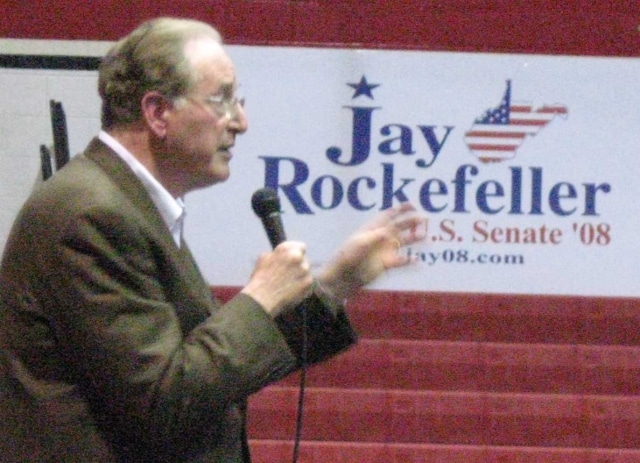This DeSmog UK epic history post follows the call made by the original American oil barons – the Rockefellers – for ExxonMobil to stop funding climate denial.
The concerns about ExxonMobil’s climate denial raised by Bob Ward, the then head of media at the Royal Society, were also exercising American Senators John “Jay” Rockefeller IV and his fellow Democrat Olympia Snowe who wrote to Rex Tillerson, chief executive of ExxonMobil, in October 2006.
Their letter, which they published online, began by congratulating Tillerson for his first year as chief executive of America’s most profitable firm, which they described as “the undisputed leader in the world energy industry” and “a company that plays a vital role in our national economy”.
They expressed hope that reports of the CEO beginning to change Exxon’s stance on climate change had been true.
Dangerous Deniers
The authors appealed to Tillerson’s patriotism in roundly attacking its funding of climate scepticism: “We are persuaded that the climate change denial strategy carried out by and for ExxonMobil has helped to foster the perception that the United States is insensitive to a matter of great urgency for all mankind, and has thus damaged the stature of our nation internationally. It is our hope that under your leadership, ExxonMobil would end its dangerous support of the ‘deniers’.”
The senators then congratulated ExxonMobil for cutting off funding to the climate sceptic public policy organisation, the Competitive Enterprise Institute (CEI), but asked that he also “come clean about its past denial activities”.
They argued that other corporations had supported the oil major in providing “significant and consistent financial support of this pseudo-scientific, non-peer reviewed echo chamber” whose goal “has not been to prevail in the scientific debate, but to obscure it.”
Rockefeller Support
The letter was all the more remarkable as Rockefeller is the great-grandson of the original John D. Rockefeller, the oil baron who, a century earlier, established Standard Oil as a near monopoly and became arguably the richest man in history.
Standard Oil was broken up because its monopoly was seen as a threat to the American economy, but, over the coming decades, some of its descendants would coalesce back into ExxonMobil.
Fred Smith, founder of the CEI, told me that the think tank managed to survive the cut in funding intact, but nonetheless expressed dismay that his environmentalist adversaries had been successful in their campaign: “I wish we were able to discredit them as much as they try to discredit us.”
He also revealed that ExxonMobil had cut funding when the think tank campaigned on an issue the oil company did not agree with. He said: “The trouble with a big corporation is they’re going to be involved in a very large number of issues, and it’s not unlikely that they might be from our perspective on the right side of a set of those issues and on the wrong side of another set of those issues.
“And more than once we’ve had a situation where we were working on an issue, where we thought the company was right on and they were supporting us, and then another issue the company was working on which we thought was wrong, we didn’t even know it at the time actually, we were working on that one and they got furious and cut us off and so on; that’s happened more than once. It was ExxonMobil as a matter of fact.”
Our next DeSmog UK epic history post will recall the climate denial backlash to the influential Stern Review, which called climate change the greatest market failure ever seen.
Photo: West Virginia Blue via Flickr
Subscribe to our newsletter
Stay up to date with DeSmog news and alerts






